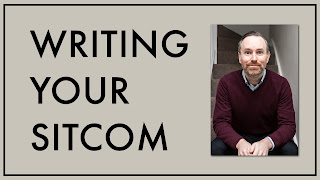I don’t quote Jesus much on this blog, and I’ll have to be honest and say he was not referring to writing sitcoms when he said this:
“For which of you, desiring to build a tower, does not first sit down and count the cost, whether he has enough to complete it? Otherwise, when he has laid a foundation and is not able to finish, all who see it begin to mock him, saying, ‘This man began to build and was not able to finish.’"Or what king, going out to encounter another king in war, will not sit down first and deliberate whether he is able with ten thousand to meet him who comes against him with twenty thousand? And if not, while the other is yet a great way off, he sends a delegation and asks for terms of peace." (Luke 14:28-32)
And so in the Gospel According to Sitcom Geek I say unto thee:
“Which of you, wanting to write a spec sitcom script will not find out when the deadline is, and figure out how long it will take to hit that deadline with a good script and work the process back from there? Otherwise the script sent in will be bobbins and there will be much wailing and gnashing of teeth that this was another opportunity missed.”
You get the idea.
A spec sitcom script is a really hard document to write. The hardest. I explain why HERE.
So what the answer? As I explain in the video below, a really common problem is that people rush to start writing the script.
Don’t rush into the script
If you don’t have a solid idea that makes the most of your voice and perspective, with characters embody that idea, you don’t have a sitcom. Not yet. But you could. And you need to allow time for that.
If you have some characters you’ll need some plots that embody that the fundamental idea of the show, which put your characters into difficult, stressful situations and in conflict with other characters. And that will be funny. But which plot should you go with?
The problem I often see in spec pilot scripts is the story of the episode is the set up. As my podcast co-host, Dave Cohen says, it’s a confusion of Plot and Premise.
Premises, Premises
The Premise of the show is the situation, the person in the place.Ted Lasso is a relentlessly positive sports manager dropped into coach a Premiership soccer team.
A young couple inherit a house that is full of ghosts that only one of them can see.
A snob with a short fuse is running a hotel called Fawlty Towers.
A man lives out his action movie/Die Hard fantasies as an actual cop in Brooklyn.
That’s the premise: the character and the situation combined.
What's the Plot?
The plot is what the characters do in the premise.
The plot is the story of the week with a beginning, a middle and an end. It’s one way in which that cop lives our his Die Hard fantasy on the 99 Precinct. And there'll be a different way next time.
It’s one way in which the frustrated hotelier is the victim of his own snobbery and short temper. And there'll be a different way next time.
Lots of spec pilot scripts are all set-up. All premise. No plot. Maybe even most specs are like this.
This often involves establishing places we’re not returning to and characters we never see again. Crucially, they don’t give any sense of what the sitcom is actually going to be like each week.
Don’t Start in Iceland
If your sitcom is about an Icelandic chef hitting the big time as a celebrity chef in Paris, and your first episode is entirely in Iceland and she gets on a plane for France at the end of the episode, we still don’t really know what the sitcom’s actually going to be.Start the show in Paris!
Let's see her cooking. Cheffing. Whatever chef's do.
We can have wistful flashbacks to her homeland in episode four or five, but give me a sense of what the sitcom is.
Sidenote: I think we’re only interested in origin stories once we’re hooked on the characters and the situation and the world.
The Premise Pilot Problem
The problem is that some actual TV shows start with set up for a whole episode (eg Ted Lasso). But if you’re an established TV writer and they commission you ten episodes for their streaming services right out of the gate, you can mess things around, start in the wrong place, build things slowly and generally take advantage of your, well, advantage. (I would still advise against doing that, but we’ll talk about that another time)
But unless you're Phoebe Waller-Bridge or Ricky Gervais, the story of your spec sitcom script should not, ideally, be all set up. The plot is not the premise. It does need to explain things and welcome in the viewer, and carefully reveal characters and information, not be an origin story.
It’s already sounding complicated, isn’t it? Let me help you out.
How to supercharge your sitcom script
You probably know a bit about story, situations and character, and how scenes should work. So you don't need to start from scratch. (For that sort of thing, take a look at my video course, Writing Your Sitcom)
In my Sitcom Supercharged course, I talk about story and plots – and a bunch of other things.
I run through some highlights and what script readers and producers are looking for from a ‘spec’ pilot sitcom script. It might not be what you think.
Then I give some concrete advice on how long each stage might take, and how to make sure you’ve got time to not just write the script, but rewrite and polish that script so that by the time you’re submitting it, you can honestly say that it’s the best you could do - and we avoid the wailing and gnashing of teeth of regret that another opportunity has been missed.
Sitcom Supercharged short and punchy, big on practical advice based on two decades of experience of writing, and the UK sitcom world. Find out more here.































